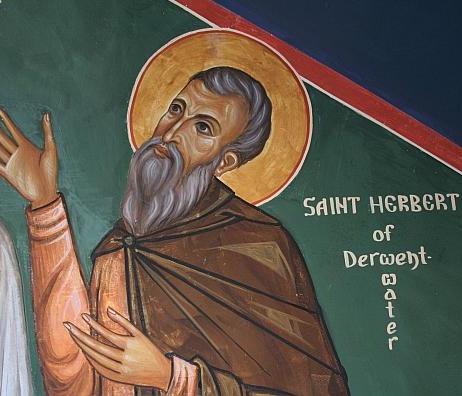(†687)
Source: http://www.keswickcatholicchurch.co.uk/html/st_herbert___his_island.html

| Orthodox Outlet for Dogmatic Enquiries | Biographies |
|---|
|
Saint Herbert, Hermit of Derwentwater (†687)
Source: http://www.keswickcatholicchurch.co.uk/html/st_herbert___his_island.html |
 |
A first approach to the indigenous Orthodox Saints and Martyrs of the Ancient Church who lived and who propagated the Faith in the British Isles and Ireland during the first millennium of Christianity and prior to the Great Schism is being attempted in our website in our desire to inform our readers, who may not be aware of the history, the labours or the martyrdom of this host of Orthodox Saints of the original One, Holy, Catholic and Apostolic Church of our Lord.
"The Church in The British Isles will only begin to grow when she begins to venerate her own Saints" (Saint Arsenios of Paros †1877)
 Amongst the beautiful isles of Derwentwater, that named St Herbert's Island deserves a more than ordinary notice, as well for its beauty as its historical associations. This insulated paradise includes an extent of four or five acres, well covered with wood, and is situated near the centre of the lake. It obtained its name from Saint Herbert, a priest and confessor, who, "to avoid the intercourse of man, and that nothing might withdraw his attention from unceasing mortification and prayer," about the middle of the 7th century, chose this island for his lonely abode. "St Herbert hither came,
And here for many seasons, from the world
Removed, and the affections of the world,
He dwelt in solitude. "
The locality was well adapted to the severity of his religious life; he was surrounded by the lake, from whence he received his simple diet. On every hand the voice of the waterfalls excited the most solemn strains of meditation - rocks and mountains were his daily prospect, inspiring his mind with ideas of the might and majesty of the Creator. That St Herbert had his hermitage on this island is certain from the authority of the venerable Bede, as well as from tradition, and nowhere could the ancient eremite find more profound peace, or a place of so great beauty, whence to bear on the wings of imagination his orisons to heaven. St Herbert was particularly distinguished for friendship to St Cuthbert bishop of Lindisfarne, with whom he was contemporary; and, according to a legendary tale, at the intercession of St. Herbert both these holy men expired on the same day, and in the same hour and minute, which, according to Bede, was in 678 or 687. At Lindisfarne, expecting death, The good St Cuthbert lay, With wasted frame and feeble breath; And monks were there to pray. The brotherhood had gathered round, His parting words to hear, To see his saintly labours crown'd, And stretch him on the bier. His eyes grew dim; his voice sunk low; The choral song arose; And ere its sounds had ceas'd to flow, His spirit found repose. At that same hour, a holy man, St Herbert, well renown'd, Gave token that his earthly span Had reach'd its utmost bound. St Cuthbert, in his early years, Had let him on his way; When the tree falls, the fruit it bears Will surely, too, decay. The monks of Lindisfarne meanwhile Were gazing on their dead; At that same hour, on Derwent isle, A kindred soul had fled. There is but little information on record respecting St Herbert, and had it not been for his intimacy with St Cuthbert, his name probably would not have been handed down to posterity at all. In truth, he did little more than pray and meditate on this spot. It was his wish to love and die unknown. Though one in spirit, St Cuthbert and the Hermit of Derwentwater were entirely dissimilar in character. St Cuthbert was bishop of Lindisfarne, and eminent preacher in his day, whose eloquence influenced the will of many, and whose active zeal contributed to the advancement of the then dominant church, of which he was one of the main pillars and rulers. St Herbert was altogether a man of prayer. He retired from the world to this solitude, and passed his days in devotion. The two saints used to meet once a year for spiritual communion. Which had most influence with the Ruler of heaven we cannot say. The venerable Bede writes thus of the “Hermit of Derwentwater”:-
It is probable the hermit's little oratory or chapel might be kept in repair after his death, as a particular veneration appears to have been paid to this retreat, and the memory of the saint; for, at the distance of almost seven centuries, we find this place resorted to in holy services and processions, and the hermit's' memory celebrated in religious offices.*
The remains of the hermitage are still visible; and near to these hallowed ruins stands a small grotto of unhewn stone, called the New Hermitage, erected some years ago by Sir Wilfrid Lawson, to whose representative the island at present belongs. The dwelling of the anchorite consisted of two apartments, one of which, about twenty feet in length by sixteen in width, appears to have been his chapel; the other, whose dimensions are considerably less, was his cell. The passion for solitude and a recluse life which reigned in the days of this saint, and was cherished by the monastic school, at first sight may appear to us uncouth and enthusiastic; yet when we examine into those times, our astonishment will cease, if we consider the estate of those men, who, under all the prejudices of education, were living in an age of ignorance, vassalage, and rapine; and we shall rather applaud than condemn a devotee, who, disgusted with the world and sins of men, consigns his life to the service of the Deity in retirement. We may suppose we hear the saint exclaiming with the poet - "Blest be that hand Divine, which gently laid My heart at rest beneath this humble shade; The world's a stately bark, on dangerous seas, With pleasure seen, but boarded at our peril; Here on a single plank, thrown safe on shore, I hear the tumult of the distant throng, As that of seas remote or dying storms; And meditate on scenes more silent still, Pursue my theme, and fight the fear of death. Here, like a shepherd gazing from his hut Touching his reed or leaning on his staff, Eager ambition's fiery chase I see; I see the circling hunt of noisy men Burst law's enclosures, leap the mounds of right, Pursuing and pursued, each other's prey; As wolves for rapine, as the fox for wiles, Till Death, that mighty hunter, earths them all." Young's Excursion Wordsworth has the following beautiful lines on the Hermit of Derwentwater: "If thou, in the dear love of some one friend, Hast been so happy that thou know'st what thoughts Will sometimes, in the happiness of love, Make the heart sink, then wilt thou reverence This quiet spot; and, stranger, not unmoved Wilt thou behold this shapeless heap of stones, The desolate ruins of St. Herbert's cell. There stood his threshold; there was spread the roof That sheltered him, a self-secluded man, After long And offices humane, intent to adore The Deity with undistracted mind, And meditate on everlasting things In utter solitude. But he had left A fellow-labourer, whom the good man loved As his own soul. And when, with eye upraised To heaven, he knelt before the crucifix, While o'er the lake the cataract of Ladore Pealed to his orison, and when he paced Along the beach of this small isle, and thought Of his companion, he would pray that both (Now that their earthly duties were fulfilled) Might die in the same moment. Nor in vain So prayed he! As our chroniclers report, Though here the hermit numbered his last hours, Far from St Cuthbert, his beloved friend, Those holy men died in the self-same day."
|
Article published in English on: 14-3-2011.
Last update: 14-3-2011.